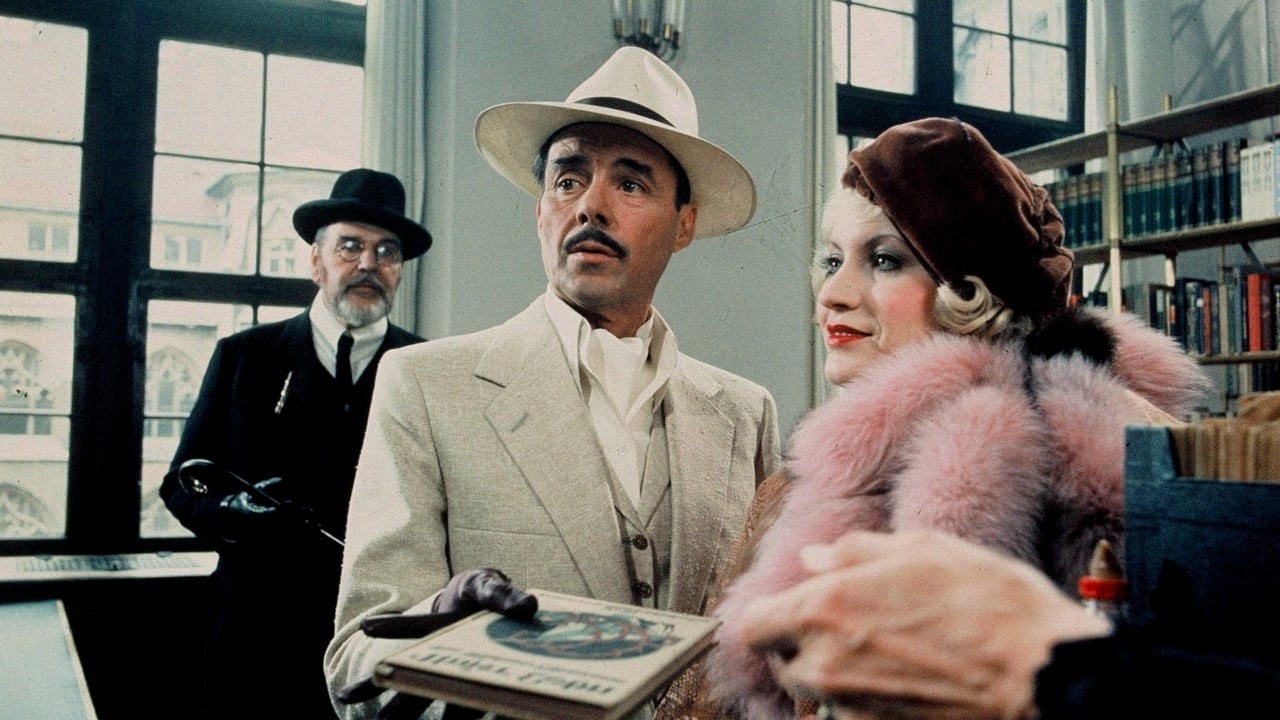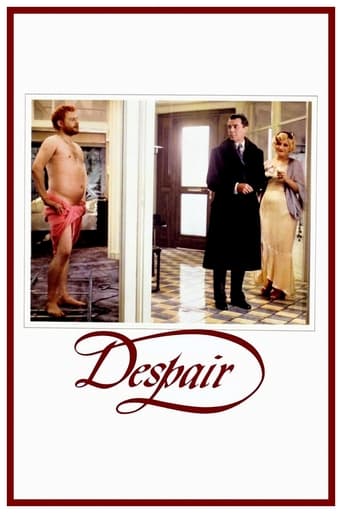Diagonaldi
Very well executed
Maidexpl
Entertaining from beginning to end, it maintains the spirit of the franchise while establishing it's own seal with a fun cast
Motompa
Go in cold, and you're likely to emerge with your blood boiling. This has to be seen to be believed.
Cissy Évelyne
It really made me laugh, but for some moments I was tearing up because I could relate so much.
tieman64
Based on a novel by Vladimir Nabokov, Rainer Fassbinder's "Despair" revolves around Hermann Hermann, a Russian emigrant who owns a chocolate factory in 1930s Berlin.Dull and overly melodramatic, "Despair" finds Hermann maritally, culturally and politically disconnected from everyone and everything around him. Trapped in a cycle of work, sex, drugs and chocolate, which he pushes upon grotesque Germans who block out life with all manners of sweetness, Hermann hatches a plan for escape. How? He will find a body double and fake his own death! Death, he hopes, will offer him solace, will end his despair, will constitute an emancipatory journey toward the light! More specifically, death will allow Hermann to escape his bankrupt company, his ditsy wife, his Jewish identity, an increasingly racist Germany and various bourgeois absurdities. To Hermann, death is freedom! Unsurprisingly, the film is dedicated to three artists - Antonin Artaud, Vincent Van Gogh and Unica Zurn - all of whom committed suicide after severe bouts of depression. "If I commit suicide, it will not be to destroy myself," Artaud said before his death, "but to put myself back together again." Some biographers view "Despair" itself as being vaguely autobiographical, Fassinder, who died of a drug overdose, seeking similar escape.Regardless, "Despair" stars Dirk Bogarde as Hermann Hermann. Klaus Lowitsch plays his double, a man who likewise seeks escape, this time from a life of poverty. Lowitsch would play the lead role in Fassbinder's "World on a Wire", another film in which he plays a double and in which life is seen to be a charade. Both "Wire" and "Despair" also end with their leads locked in what their blissful but now insane minds wrongly believe to be "reality". In "Wire", Lowitsch dances in computer simulated rooms. In "Despair", Bogarde sleeps in a grimy apartment up in the Swiss mountains, believing himself to be a movie actor and life to be an elaborate movie production. Hermann's dislocation and disassociation may be complete, but despair never leaves him.6/10 - See 1962's "Lolita".
Krystine-3
Wonderful pattern of REAL ART-film for me.I suppose Fassbinnder showed very precisely here, the difference between artistic reality and rough and dull one, maybe they can penetrate each other, but eventually that's impossible for the first to exist, when the second is becoming aggressive. As I read, Hermann of Nabokov in the novel "Despair" is a kind of artist. Fassbinnder based his film on this moment as I understood: he dedicated the film to Van Gogh and other artists.Marvelous world of Hermann's house with sweet and funny (like chocolate?!) Hermann's wife Lydia and her brother Ardalion (amazing red-haired and red-bearded Russian, in highest extent picturesque and grotesque but exquisite image of how-Europeans-imagine-Russians). This candy paradise is being eaten by insatiable and horror monster.But who is that monster or what is that monster, I think, here are many variations. Hermann's artistic and refined mind itself, which created all this splendor before, may be. Or banal savage real-life of barracks, from which Hermann wants to escape at the end of film.Many things in the film are flying above the ground. Like Nabokov's butterflies: main characters - Hermann and relatives, exquisite absurd humor, locations of house, restaurant, even Hermann choco factory in lilac color, holiday at the lake (Ardalion - mermaid man :))). Stepping on the ground are only awful bearded and haired Felix - double-ganger, as usual Nazi-men in the streets, detectives-noir.Dirk Bogarde, yet more slim and dry as never before, as a new-level reincarnation of his previous morbid and fatal characters in cinema, finally becomes quite abstract figure. And it's a brilliant zenith of his long and complex actor career as I think.Yet I'd add that Despair is a great example of how can make films about artists - sparkling but not heavy-weighted costume biopics.
wedgwood
This is one classic I was in no mood for at the time of watching it. In the right mood, I suppose even the most boring, confusing and pretentious films can appear lively and spirited.Hermann is a Russian living in Germany with his completely idiotic Russian wife whose only talent is letting him bang her. Whereas even this right isnt exclusive since she is also carrying on with her red-headed bohemian slob of a cousin. Here is the weird part -Hermann keeps seeing himself everywhere, in particular watching he and his wife having sex. He mistakes this for out of body experiences, or split personality and does nothing to help himself out of it, instead entertaining and even encouraging it. Soon he begins to see his own face in other people. He befreinds a tramp who he believes is his look-alike and convinces him to be his body double to create an alibi while he is committing a crime. He dresses him up in his clothes, puts his papers in his pocket and gives him a shave -then he shoots and kills him. Hermann runs away with the understanding he has staged his own death. Obvious to everyone else is that it wasnt him at all, as his passport photo and the dead mans face don't even remotely resemble each other.To be perfectly honest I tuned out of the dialogue after this point and only occasionally glanced at the screen. Despair was not improving, resulting in a complete waste of time. From what I saw it only gets weirder but perhaps with concentration it might begin to fall together. I like bizarre films, and even pretentious ones sometimes. Despair was just too damn over-dramatised or something. I just felt like the guy was digging his own grave and then constantly bitching about it like it was someone elses fault.Yes, the acting was good, but sorry, the characters sucked.
Mo Mo
It's hard for me to stay away from excessive use of superlatives when commenting on what I consider to be Fassbinder's masterpiece. Michael Ballhaus has filmed more than a dozen Fassbinder films, and Despair is a fine example of the value of their collaboration. Several images are stunningly memorable: the water dripping on the eggshells in the sink; the circular tracking shot through the glass walls of Hermann Hermann's office revealing him in his cage; and the auto-voyeurism of Hermann watching himself in bed with his voluptuous, vacant Frau. Doing justice to Nabokov's compelling dialog and canny character studies has been well done before in Kubrick's Lolita, but Tom Stoppard's rendition here was a perfect match for Fassbinder's (and Ballhaus's) visual feast. And if you are somehow not yet a fan of Dirk Bogarde, seeing his performance in Despair will surely make you as ardent an admirer of his work as I have become.

